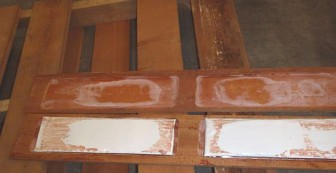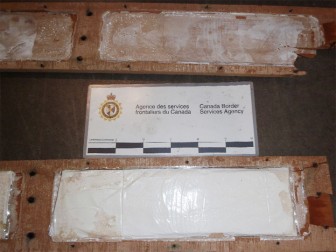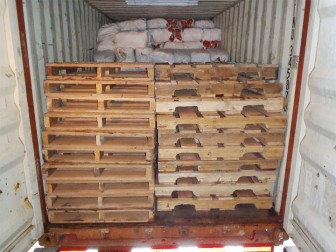Canadian law enforcement authorities have arrested eight persons after seizing 170 kilos of cocaine, hidden in wooden pallets used to transport food from Guyana.
The cocaine, with an estimated street value of Cdn$21 million, was seized in two separate drug busts at the Port of Saint John, New Brunswick, according to a news release from the Royal Canadian Mounted Police (RCMP). “Approximately 170 kilograms of cocaine were discovered in shipping containers that came through the Port of Saint John destined for the Toronto area. Eight men ranging in age from 31 to 70 have been charged with importing, conspiracy to import, and possession for the purpose of trafficking,” the release said.

The Canada Border Services Agency (CBSA) which collaborated with the RCMP in the seizures said that both containers originated in Guyana. Questions will be raised immediately as to whether the cocaine was stashed in Guyana and then exported as has previously been the case in finds in New Brunswick. The seizures took place on May 29 and June 5.
Customs Anti-Narcotics Unit (CANU) head James Singh told Stabroek News yesterday that the agency was aware of the busts but could not comment further due to the continuing investigations.
“On May 29, 2012, CBSA agents inspected a cargo shipping container where they discovered approximately 120 kilograms of cocaine. Bags of cocaine were concealed within several wooden pallets stacked within the container. The pallet boards had been hollowed out and filled with bags of cocaine. The container which also contained food products was destined to Ontario,” the RCMP said. “On June 16, 2012, five men were arrested in Ontario and charged with importing narcotics, conspiracy to import cocaine, and possession for the purpose of trafficking,” the release added.

Police have charged James Joseph Buttazzoni, 40, and Gary Glen Ramoutar, 41, both from Toronto; Rampersaud Ramlall, 37, of Whitby, Ontario; Lawrence Fitzpatrick Dalloo, 50, of Ottawa, and Sean Mohammed Hussain, 31, of Mississauga. All five men are scheduled to appear in court on July 9, 2012.
A CBSA statement said that the drugs were found while conducting a secondary examination of a marine container. The shipment included sauces, seasonings and noodles originating in Guyana and destined for Mississauga, Ontario. Using X-ray technology, border services officers detected anomalies within the wooden pallets in the shipment. A total of 121 kg of cocaine was seized, the statement said.

In a second seizure on June 5, CBSA agents again discovered another container, also destined for Ontario, containing cocaine concealed in wooden pallets. This time approximately 48 kilograms of cocaine was found. The sea container was allegedly en route from Guyana, via the port of Saint John to Toronto where it was addressed to an area business, the RCMP said. On June 18, RCMP arrested three individuals, Joseph Compton Grant-Stuart, 57; Ephraim Augustus Grant-Stuart, 56; and Dennis Andrew Grant-Stuart, 70, all of Toronto. They have all been charged with importing narcotics, conspiracy to import cocaine and trafficking cocaine. All three men were scheduled to appear in court yesterday.
“Through the combined efforts of the RCMP and CBSA we have been able to remove a very large quantity of cocaine off the streets,” Inspector Lise Roussel, New Brunswick RCMP Federal Policing Operations was quoted as saying. “This means that more than a half a million illegal drug deals have been stopped.”
“Gangs and organized crime have influenced the drug trade for years,” stated Superintendent Rick Penney, RCMP Greater Toronto Area Drug Commander. “We are starting to see a spill over into our daily lives and some of the shootings we are seeing in our neighbourhoods clearly demonstrate the effects illicit drugs are having on our communities,” he said.
The Canadian Broadcasting Corporation quoted the CBSA as saying that the drugs have an estimated street value of more than Cdn$21 million. “This is a very significant seizure here in our region,” Andrew LeFrank, regional director general for CBSA, Atlantic region, stated in a release.
“We have kept hundreds of thousands of doses of this dangerous drug off our streets, and kept the profits out of the pockets of drug smugglers,” he said, according to CBC.
Last year, RCMP and border officials intercepted cocaine-stuffed pineapples which originated in Guyana, at the New Brunswick port. There were two seizures between August and October, totalling 28 kilograms.
The estimated street value was CDN$3.5 million, CBC said.
In 2008, Canadian authorities in New Brunswick and the US DEA in the Caribbean island of St Croix intercepted 376 kilograms of cocaine which was hidden in dividers separating bottles of pepper sauce from Guyana.
One shipment was busted on December 8, 2008 in New Brunswick, Canada and the other was nabbed on December 24, 2008 in St Croix, the US Virgin Islands after Canadian authorities tipped off the US DEA.
Local authorities had determined that the cocaine was packed among the pepper sauce bottles in Guyana. Many people were questioned locally by the Customs Anti-Narcotic Unit but no charges were ever brought in connection with this major bust.
Following the seizure of the first pepper cocaine shipment Mahendrapaul Doodnauth, who unloaded the boxes at a rented storage facility on Rexdale Boulevard in Toronto was arrested by Canadian authorities.
He was later charged with importing cocaine, conspiracy to import cocaine and possession of cocaine for the purpose of trafficking. It is unclear what became of this case.
CANU then issued a bulletin for Indarpaul Doodnauth and he made himself available to the agency for questioning. Doodnauth, an East Coast-based businessman is the brother of Mahendrapaul Doodnauth. Indarpaul was later released.










